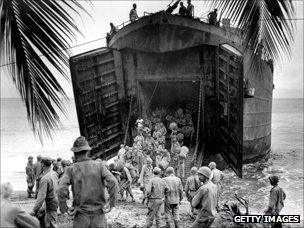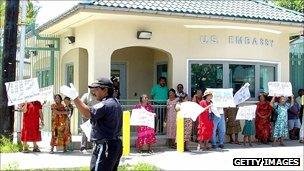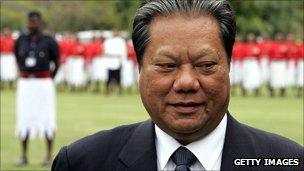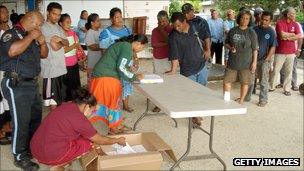Marshall Islands profile - Timeline
- Published
A chronology of key events:
circa 2000 BC - First Micronesian navigators arrive in the Marshall Islands, naming the atolls Aelon Kein Ad - "our islands". They are skilled navigators able to make long canoe voyages among the atolls.
1521 -29 - Portuguese navigator Ferdinand Magellan and Spaniard Miguel de Saavedra visit the islands.
1592 - Spain lays formal claim to the islands.
1788 - The Marshall Islands are given their name by British Naval Captain John William Marshall who sails through the area with convicts bound for New South Wales.
1864 - German Adolph Capelle establishes the first trading company. Several other German trading companies follow suit.

US troops seized the islands from Japan in 1944.
1885 - Germany annexes the Marshall Islands and pays Spain 4.5 million US dollars in compensation. Germany leaves the running of the islands to a group of powerful German trading companies.
German protectorate
1886 - Germany establishes a protectorate over the islands.
1887 - The Jaluit Company, a German corporation, is entrusted with the governance of the Marshall Islands.
1914 - Japan captures the islands and builds several large military bases there.
1920 - League of Nations grants Japan a mandate to administer the islands.
1944 - US forces capture islands from the Japanese.
Nuclear tests
1946 - US begins a nuclear weapons testing programme called Operation Crossroads on Bikini Atoll. Chief Juda of Bikini agrees to evacuate the 167 islanders to Rongerik Atoll, 125 miles east of Bikini Atoll, on the understanding that they will be able to return once the tests are over.
1947 - The Marshall Islands becomes part of the Trust Territory of the Pacific Islands created by the UN and administered by the US.
1948 - Islanders are forced to evacuate Enewetak Atoll as US expands nuclear weapons testing programme in the area.
1954 - Bravo, the most powerful hydrogen bomb ever tested by the US, is detonated on Bikini Atoll.
1965 - US government sets up the Congress of Micronesia in preparation for greater self-governance in Micronesia.
Health worries
1969 - US embarks on a long-term project to decontaminate Bikini Atoll.
1970s Islanders are told that it is safe to return to Bikini but are subsequently found to have dangerous levels of radiation in their bodies and are evacuated once again. Following exposure to such high levels of radiation the islanders begin to develop severe health problems.
1973 - Marshall Islands withdraw from the Congress of Micronesia seeking greater political independence.
1979 - Independence. US recognises the Constitution of the Marshall Islands and its government. Amata Kabua is elected president.
1980 - Having removed much of the topsoil on Enewetak Atoll, the islanders are permitted to return.
1982 - Officially renamed the Republic of the Marshall Islands.
Compact with the US
1983 - Marshall Island voters approve the Compact of Free Association with the US which will give them independence. The Marshall Islands will receive financial and other aid from the US, which retains responsibility for defence. The US keeps its military base on Kwajalein Atoll. Today this is a vital part of the US missile defence shield tests.
1985 - US agrees to complete the decontamination of Bikini Atoll within 15 years.

2003: Nuclear test victims protest calling on US to continue funding compensation and treatment
1986 21 October - US Congress ratifies a Compact of Free Association giving the Marshall Islands independence. Islanders are promised compensation for damage caused by nuclear tests in the 1940s and 50s.
1988 - US-funded Nuclear Claims Tribunal is set up to determine a final compensation package to the islanders.
1989 - UN report warns that rising sea-levels will completely submerge the Marshall Islands by 2030 because of global warming.
UN membership
1990 - UN terminates trusteeship status. Country is admitted to the UN in 1991.
1996 - Radiation levels are considered low enough to permit the return of tourism to Bikini Atoll.
1998 - Marshall Islands become one of only a handful of states to officially recognise Taiwan.

Kessai Note was president from 2000 until 2008
2001 - Nuclear Claims Tribunal determines damages to be paid to Bikinians. There is not enough cash to honour the award and it is left to the Bikinians to petition the US for more money. A decision is expected to take years.
2003 December - US president signs new Compact of Free Association, worth $3.5bn over 20 years, with Marshall Islands and Micronesia.
2004 January - President Kessai Note begins second four-year term.
2007 August - The Organisation for Economic Cooperation and Development (OECD) removes the Marshall Islands from its blacklist of uncooperative tax havens.

The 2007 national election was marred by a late start
2007 November - National election takes place amid reports of "chaotic" organisation.
2007 December - Election results show no clear winner and are challenged in court and by a number of recount petitions.
2008 January - Parliament elects former speaker Litokwa Tomeing as president by 18 votes to 15.
2008 December - Government declares state of emergency as waves flood Majuro and Ebeye urban centres, displacing hundreds of people.
2009 October - Jurelang Zedkaia is chosen as president after Litokwa Tomeing is ousted in a no-confidence vote.
2012 January - Christopher Loeak becomes president.
2013 September - Pacific island leaders meet in Marshall Islands, sign "Majuro Declaration" promising to tackle climate change.
2014 April - The Marshall Islands sues all nine of the world's nuclear-armed states for allegedly failing to pursue disarmament talks stipulated under the 1968 Nuclear Non-Proliferation Treaty.
2014 March - Marshall Islands declares a state of emergency after major flooding.
Generational change
2015 November - General election sees many veteran politicians lose office, including half the cabinet. Neither President Loeak's supporters nor the opposition KEA party muster a majority.
2016 January - Parliament elects independent senator Hilda Heine first female president of the Marshall Islands, after toppling President Carsten Nemra in no-confidence vote. He held office for one week.
US drops Forum Fisheries Agency treaty with Pacific nations, leaving Marshall Islands facing serious shortfall in revenues from fees.
2016 October - International Court of Justice rejects cases brought by the Marshall Islands against Britain, India and Pakistan for their alleged failure to pursue nuclear disarmament, saying it does not have jurisdiction in the matter.